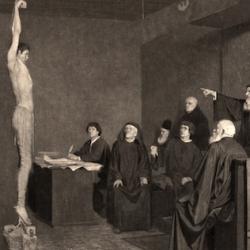Thomas Woodward has written a fascinating history of the Intelligent Design (ID) movement in Doubts About Darwin (Baker, 2003). His focus is on the history of the rhetoric of the debate (examining the ethos of each participant, the appeals to pathos, as well as the logos). Along the way, he explores how the different sides in the debate differ in their mode of telling the story of Darwinism, the development of evolutionary theory, and so on. This vantage point makes the book more than a history of ID (important as that is in itself). It becomes a close study of how intellectual change takes place through shifting rhetorical positions, and therefore gives a lot of insight into how “paradigm shifts” might take place in other realms ?Esuch as Reformed theology, to take an arbitrary example.
I cite two particulars to illustrate the point: Woodward devotes an early chapter to Michael Denton’s Evolution: A Theory in Crisis , one of the first major anti-Darwinian treatises that did not rely on appeals to Scripture. Though few biologists abandoned were persuaded by Denton, he created a significant furor, and more importantly opened up the rhetorical and intellectual space in which ID could develop. Once Denton has said his piece, the next skeptic’s task was all the easier; the next skeptic was not “breaking the silence” but was building on something that had already been said.
The second example is Philip Johnson’s work, which is a model not only of academic and intellectual integrity but intellectual shrewdness and cunning. Johnson became skeptical of Darwinian claims after reading Denton and Richard Dawkins’s The Blind Watchmaker during a sabbatical from the Berkeley law school. He realized that taking on Darwinism, especially as a law professor without scientific credentials, was quixotic, and for that very reason found the project irresistible. Several times in the account, Woodward writes of the “fun” that Johnson had during debates with biologists and philosophers. That is a crucial point about intellectual combat: Not only did Johnson’s sense of “play” keep him from becoming agressive and harsh, it also made his position attractive to observers. Woodward recounts a debate with Stephen Jay Gould. Gould attempted to launch a nuke at Johnson, and was so agitated that he was visibly shaking as he spoke. This damaged Gould’s ethos by making his behavior an important issue in the debate, and also left Johnson as the far more attractive and reasonable party.
Johnson realized when he began the project that his lack of credentials would subvert his ethos in any debate on evolution, and he took deliberate steps to address that issue. He opened communication with a number of leading biologists, and regularly sent them drafts of papers and books he was writing. The first public presentation of his views came at a colloquium sponsored by the law faculty at Berkeley, in which Johnson played host to a number of scientists and philosophers. This accomplished a number of things: Since it was a private meeting and debate, it lacked some of the pressure of a public forum. Johnson was able to test the strength of his ideas and arguments before going public with them. Most shrewdly, and perhaps most importantly, by having his own faculty sponsor the debate Johnson created an intellectual space where Darwinism could be radically questioned and where the issues could be discussed in the open. Once that was accomplished, there was real no turning back. Like Denton’s book, Johnson’s colloquium opened up the opportunity for others who wanted to challenge the Darwinian paradigm. Finally, Johnson used every debate as an opportunity to meet and forge links with the leading scientists in the field. That could only improve his ethos. By admitting him to the table in the first instance, Darwinian biologists were helping his cause, whatever the outcome of a particular debate.















